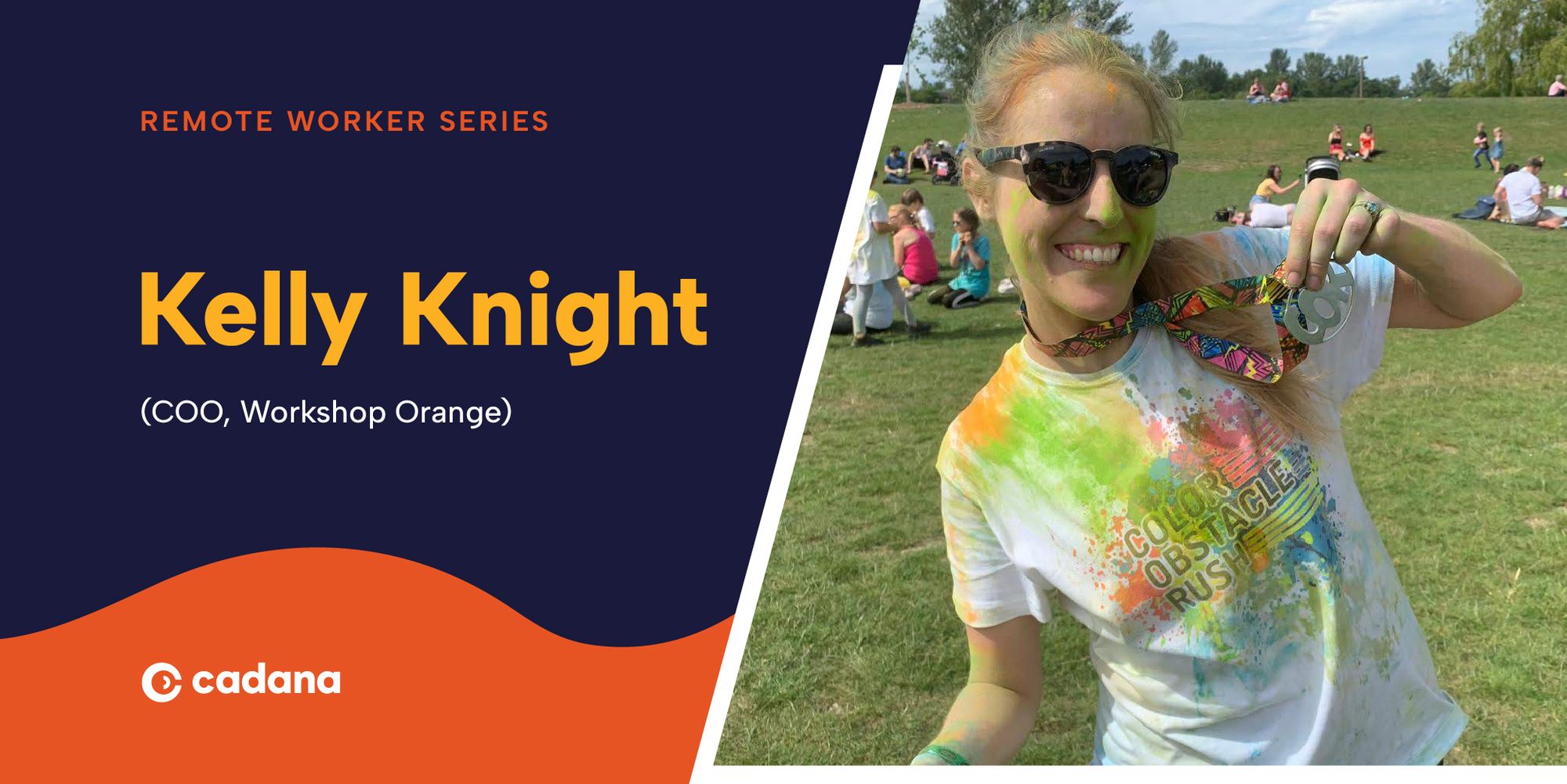Kelly Knight: "I can explore the world and interact with people while still getting work done."

In this episode of Cadana remote worker series, we had a conversation with Kelly, COO and co-founder of Workshop Orange. We covered various topics related to remote work, including its benefits, hacks for working remotely, avoiding burnout, managing remote teams, and effectively hiring remote workers.
Tell us about yourself and your company.
I'm the COO and co-founder of Workshop Orange, a remote-first digital agency that started in 2019. Our core team has 12 full-time project managers, developers, and designers, and we also work with over 20 contractors, freelancers, and partners from around the world. With diverse backgrounds in data science, ethics, physics, entrepreneurship, supply chain management, linguistics, and more, our team brings unique insights to our work and stands out in a competitive marketplace.
How long have you been practicing remote work?
Workshop Orange is my first experience with full-time remote work, and that started to take shape around September 2019, so I’ve been fully remote for over 3 years now.
What is the best part of being able to work from anywhere?
Being able to work remotely provides many benefits, such as flexibility, improved mental health, and efficiency. You can go on long weekends without worrying about emergency meetings or take breaks to go to the gym or meet friends for brunch or even take the dog for a walk in the middle of the day! Changing your environment can also boost productivity and improve mental clarity (I’m typing this from my favourite coffee shop right now). Previously, commuting and working in a cubicle for 8 hours a day made me feel like I was stuck in a rut. and I love being able to change my environment. Now, I can explore the world and interact with people while still getting work done.
Where is the most interesting place you have done work from? (Eg Hiking trail, beach, a specific country.
Living in Barbados, I used to take my kayak out in the morning before work, bringing my phone with me in a waterproof bag around my neck. I'd listen to my Spotify playlist and sometimes check in with my team on Slack while watching the fish on the reefs.
What are your favorite remote working hacks?
Bring two laptop chargers - one for your home/apartment/Airbnb and one for your backpack. Forgetting your charger can be a real pain if you're out and about, especially if you've traveled far to get to where you want to be. This is even more critical if you only have your backpack for a weekend away.
Invest in a fashionable backpack. This may sound silly, but trust me, it's not! Nothing ruins a nice outfit more than an old, dated, or worn-out laptop backpack. Opt for something that looks good - after all, you'll be carrying it around a lot.
Some remote workers report symptoms of burnout. Have you experienced this and do you have any tips for how remote workers might avoid/handle burnout?
I faced a similar problem and found a solution, but it may not be universal. As a founding partner at Workshop Orange, I briefly stepped back, re-evaluated my role, and returned with a new approach and focus. If possible, use leave days to regroup, then speak with your manager about the challenges you're facing. Suggest a different role, request a change in hours or projects. If your team has a toxic culture, it may be best to leave. However, if you work with good people, talk to them first before updating your CV.
Communicate your work patterns to your team if you need breaks throughout the day. It's important to avoid constant questions about your whereabouts, but you can balance your interests with putting their minds at ease. With practice, you'll find it easier to step away for short periods. Your team will notice you're more focused during important meetings.
To avoid work burnout, set boundaries early. If possible, control your workload and avoid sending messages or emails after a certain time at night. Otherwise, people will always expect you to be available. Work can encroach more and more until it consumes your entire day. While this may not be possible for everyone, it is important to make an effort to prioritize your well-being.
Have you managed teams as a remote worker? About how many do you manage now or have managed in the past?
The core team at Workshop Orange is about 12 people strong but I have a great VP of Ops to support in people management.
As a manager, Is there anything unique about the virtual hiring process and what tips do you have for hiring remote workers effectively?

Hiring remote workers and ensuring their effectiveness can be challenging. To attract the right applicants, adjust the job listing to reflect the remote nature of the job and outline the remote work requirements and team culture. Additionally, use targeted job boards to attract the right candidates from the correct time zones and countries. It's important to be strategic in your hiring process, especially if you don't have a large recruiting or HR team to support you.
For hiring, I post the job, scroll through applications, download shortlisted ones, and add them to a Notion board with statuses for different stages of the process. Applicants submitted a 1min video about themselves, talking about casual topics such as the origin of their name, their last movie/series watched, or their favorite holiday spot. This step helped us shortlist candidates who were good speakers, well-presented, and a good culture fit for a client-facing role. We were left with 30 shortlisted candidates out of 250 applicants for a single role. We conducted 30min interviews asking basic questions about their experience, interests, and goals followed by a short assessment.
Our assessment requires candidates to respond to internal and client comms in a hypothetical Slack space, and write an email addressing client concerns related to their job. This evaluates their writing style, remote communication skills, energy level, and reading comprehension, all of which are critical for remote roles that can't be reviewed in face-to-face interviews. In the past, some candidates who performed well in interviews struggled with the assessment.
As a manager, do you have difficulty tracking worker performance?
Workshop Orange takes a personalized and hands-on approach to performance. We use open-ended questions instead of strict KPIs in our performance review meetings and schedule weekly one-on-ones to check in with team members and gather feedback on how they prefer to receive criticism and guidance. Feedback is given immediately and is specific to the project or task. We make sure team members are never blindsided by anything during performance reviews. If someone is struggling, we may transition them into a different role or offer support such as extra time off or a new task management structure. Our focus is on creating positive vibes, not just meeting KPIs 😄
What are some ways to manage your team’s accountability?
Hiring conscientious people is key, but it's not always straightforward. Trusting your team to do their work is critical to team happiness, and setting clear expectations and requirements helps manage accountability. If a team member doesn't complete their assigned work, we follow up with them and ask if there are personal circumstances we can support with or if they need help with task management. We may also provide extra support, like working alongside a PM or having more frequent check-ins.
What are you looking forward to the most for the rest of the year as a remote worker?
Workshop Orange is launching Workshop Blue, which I'll lead. We'll develop our own products for various remote markets, researching best practices for remote workers, remote teams, and remote living. This is an exciting expansion for us, with partnerships and products planned for 2023 and 2024.
